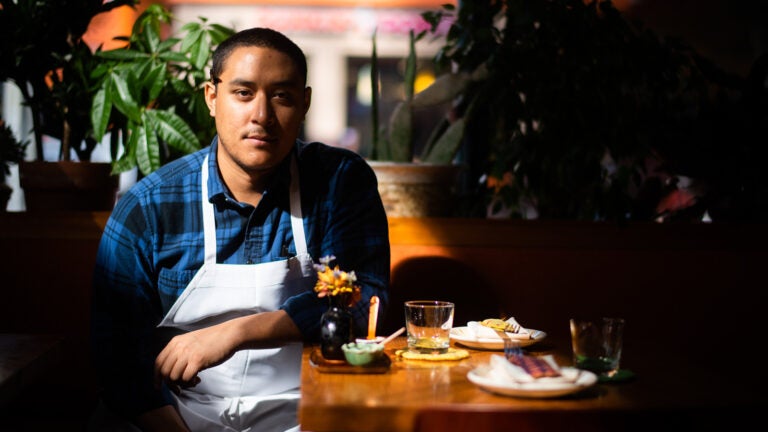
Underground restaurant launches an alumnus’ career
As a student at the USC Dornsife College of Letters, Arts and Sciences, Saturday mornings for Alex Chang began at 6 a.m. Rising with the sun, he’d cross town to the Santa Monica Farmer’s Market where produce, trucked down from California’s Central Valley, sat waiting. Later that evening, he’d use his market findings in the elaborate dinner he and fellow USC student Robert Kronfil were hosting at Paladar, an underground restaurant run from their campus apartment.
Several nights a week, patrons elbowed around a sturdy table (built by Chang’s obliging landlord) awaiting dishes like squid-ink pasta and duck-leg confit that Chang prepared in a small kitchen adorned with USC flags. By the time he graduated in 2011, Chang had served over 5,000 meals at Paladar, Vice News had covered the pop-up, and a documentary was in the works.
His career had launched.
Globe-trotting Trojan
After graduation, Chang jetted first to Europe for chef apprenticeships that bolstered his classic cooking techniques, then back to Los Angeles to work at the James Beard Award winning Animal before landing in Miami to help open the Vagabond Restaurant and Bar. In 2017, he returned to L.A., where he’s now head chef for the Freehand hotel.
Freehand’s restaurant, the Exchange, serves entwined California and Israeli fare. Avocado salad and local red snapper share menu space with labneh and pargiyot. The international layering ties well with Chang’s own global upbringing. His Chinese father was raised in Tokyo, then moved to the U.S. as a teenager. His maternal grandparents immigrated from Mexico and settled in South L.A.. Chang was born in Hong Kong and his family lived in numerous cities in addition to Tokyo before settling in Santa Barbara, California.
Neither of his parents were particularly avid cooks, but good food remained central to their home life as they bounced across the globe.
“Even when we lived in New Jersey, where there weren’t that many Chinese places, my dad would drive us 20 minutes to go have dim sum every Saturday,” he says.
One food tradition had a special Trojan connection: Chang grew up frequenting Phoenix Inn, a Chinatown restaurant his dad, a graduate of USC Marshall School of Business, dined at regularly while a student at USC.
“When I eat there now,” Chang says, “the same guy still runs it from when my dad was in school, and that I remember from when I was a kid.”
Kitchen confidential
When Chang first arrived at USC Dornsife, it wasn’t a career in food that was on his mind. It was athletics. He was an avid baseball player in high school and had decided to major in kinesiology, considering a career in sports medicine.
Life on the USC campus gradually intervened. Sophomore year he moved into an apartment with several students, including Kronfil, a music major. Both enjoyed cooking and both were finding the nearby dining options paltry. They started hosting dinner parties for friends, and, as word spread, more formal gatherings that included a fee to recoup costs. With a $200 investment in glassware and plates, plus that custom dining table courtesy of their landlord, Chang and Kronfil were soon in business.
Running an underground restaurant without any formal chef’s training didn’t intimidate Chang. He came of age with the internet, where videos on how to break down a chicken or deglaze a pan were readily available, no toque blanche needed.
“Before the internet, you had to go and work for somebody and they had to show you all the techniques,” he said. “Now, anything you want to find out or see or learn, or a product you don’t know anything about, you have access to online.”
This was also the era of Anthony Bourdain, an influence Chang cites, whose wild tales of life as a New York City chef inspired a new generation of cooks. To Bourdain, the restaurant kitchen was a gonzo, disinhibited place that cared less about your training and more about your grit.
Chang was also influenced by the complex, inventive recipes of David Chang, whose irreverent Manhattan restaurant Momofuko set trends when it opened in 2004. The 2009 cookbook of the same name graced Alex Chang’s shelves while at USC Dornsife.
Family-Style Seating
YouTube tutorials couldn’t cover everything though. As his enthusiasm for cooking grew, Chang took a summer job at a restaurant in Santa Barbara washing dishes and shucking oysters. During the semester, he worked as a prep cook at USC’s University Park campus restaurant Moreton Fig.
Despite the increasing demands of Paladar, Chang maintained a full course load. His major was unrelated to his newfound passion, but the classroom experience was formative.
“You learn how to work and the kind of work that it takes to be successful,” he said. “And, you learn how to think for yourself, make your own decisions, and also think critically.”
The USC community outside the classroom was also crucial to his growth. It was USC students that arrived at Paladar in droves, driving demand and attention. Gil Freston, then a student at USC School of Cinematic Arts, shot a documentary of the supper club as part of a class project. The film went on to debut at the Tribecca Film Festival.
It seems fitting, then, that Chang chose to name his venture “Paladar.” The term refers to Cuban in-home restaurants. Patrons dine at the homeowners table and, for one meal, become part of the same family — a philosophy Chang’s venture fully embraced.
The familiar atmosphere even transcended the somewhat exotic offerings Chang created. When asked what dish, out of all his three-course and experimental offerings, was most popular, Chang laughs.
“Hamburgers,” he says.